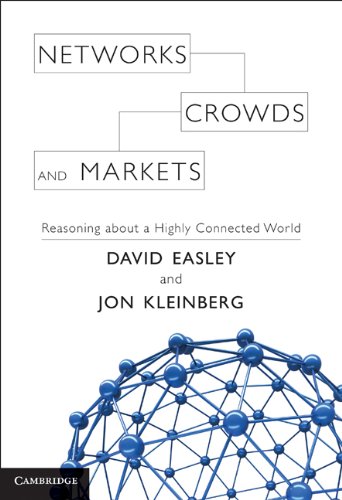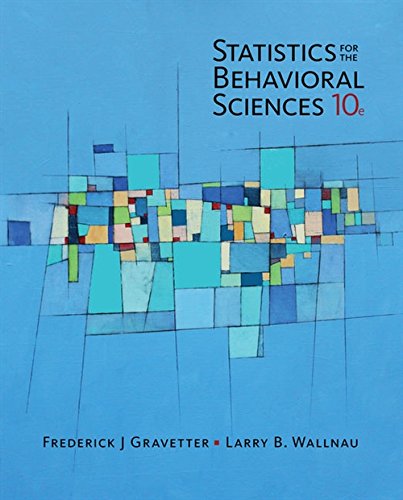Reveals the interdisciplinary field of networks, which changes how we look at social, financial and technological interactions in modern society. –This text refers to the hardcover edition.
“The field of information networks is an emerging discipline of immense importance that combines graph theory, probability and statistics, microeconomics and facets of the social sciences. Easley and Kleinberg present a panoramic view of this field, from basic graph theory all the way to the state of the art in research.”
Prabhakar Raghavan, Head of Yahoo! Labs
“Networks are everywhere, in our social lives, in our economic relations, and in nature; they are now finally arriving to our classrooms. Easley and Kleinberg have written a masterful introduction to networks. This book successfully combines the game theoretic and algorithmic approaches to the study of social, economic and communication networks. It is lively, interesting, readable and accessible. It is a pleasure to teach using this book and never a dull moment for the students.”
Daron Acemoglu, Charles P. Kindleberger Professor of Applied Economics, Massachusetts Institute of Technology
“The first college-level text on network science, it should be a big hit for students in economics and business.”
Stan Wasserman, Rudy Professor of Statistics, Psychology, and Sociology, Indiana University
“In this remarkable book, David Easley and Jon Kleinberg bring all the tools of computer science, economics, and sociology to bear on one of the great scientific challenges of our time: understanding the structure, function, and dynamics of networks in society. Clearly written and covering an impressive range of topics, “Networks, Crowds, and Markets” is the ideal starting point for any student aspiring to learn the fundamentals of the emerging field of network science.”
Duncan Watts, Principal Research Scientist, Yahoo! Research, and author of Six Degrees: The Science of A Connected Age
“David Easley and Jon Kleinberg have given us a totally new kind of basic economics text, where students learn how to analyze social networks and crowds as well as games and markets. This book covers a remarkable range of topics and offers a broad new vision of what economics can be about.”
Roger Myerson, Glen A. Lloyd Distinguished Service Professor of Economics at the University of Chicago and winner of the 2007 Nobel Prize in Economics
“In my three decades plus of teaching, I cannot recall an urge to teach a new undergraduate course like the one I felt upon leafing through this wonderful introduction to everything that is new and important and intellectually challenging in our world.”
Christos Papadimitriou, C. Lester Hogan Professor of EECS, University of California, Berkeley
“The elegant explanations in this book allow readers to rapidly gain a deep understanding of how networks work. Without resorting to either advanced math or even a bit of hand-waving, Easley and Kleinberg take us through the essential concepts and intriguing real-world applications.”
Professor Lada Adamic, School of Information and Center for the Study of Complex Systems, University of Michigan
Check out this review: Read Suite 101’s Review Here.
“This unusual range of topics is what makes this book invaluable. Instead of just focusing on abstract mathematical models and their formal properties, it puts models in their proper place within a process that begins with empirical observations, leads to mathematical models, is followed by some predictions, and is then subject to experimental validation that starts the cycle anew. In the meantime, one reasons about the connected world around us, discovers some facts, gets some insight into the behavior of complex systems, and even enjoys some “aha!” moments. The book is a pleasure to read.”
Fernando Berzal, Computing Reviews
“The book is clearly written and produced to the quality you can expect from CUP. This important and inspiring book must not be missing from the computer scientist’s bookshelf in the 21st century, be it because they ought to be teaching the material to their students as an academic, be it because they are a practitioner who want a fundamental understanding of the methods they may already deploy, and how they relate to other areas.”
Jochen L. Leidner –This text refers to an out of print or unavailable edition of this title.
About the Author
David Easley is the Henry Scarborough Professor of Social Science and a Professor of Economics at Cornell University. He was previously an Overseas Fellow of Churchill College, Cambridge. His research is in the fields of economics, finance, and decision theory. In economics, he focuses on learning, wealth dynamics, and natural selection in markets. In finance, his work focuses on market microstructure and asset pricing. In decision theory, he works on modeling decision making in complex environments. He is a Fellow of the Econometric Society and a member of the NASDAQ-OMX Economic Advisory Board.
Jon Kleinberg is the Tisch University Professor in the Computer Science Department at Cornell University. He is a member of the National Academy of Engineering and the American Academy of Arts and Sciences. His research focuses on issues at the interface of networks and information, with an emphasis on the social and information networks that underpin the Web and other online media. He is the recipient of MacArthur, Packard, and Sloan Foundation Fellowships; the Nevanlinna Prize; the ACM-Infosys Foundation Award; and the National Academy of Sciences Award for Initiatives in Research. –This text refers to an out of print or unavailable edition of this title.
Book Description
This introductory undergraduate textbook draws on economics, sociology, computing and information science, and applied mathematics to understand networks and behavior. It describes the emerging field of study that is growing at the interface of these areas, addressing fundamental questions about how the phenomena of the connectedness of modern society involve networks, incentives, and the aggregate behavior of groups of people. –This text refers to an out of print or unavailable edition of this title.










Reviews
There are no reviews yet.